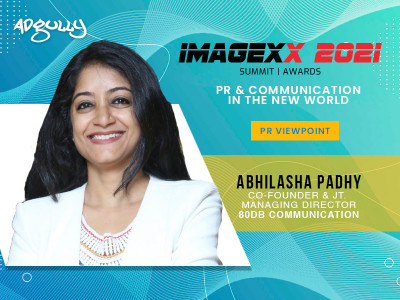“The future of PR is in harnessing an optimal mix of creativity & technologyâ€
As part of the build up to Adgully’s first PR summit – IMAGEXX 2021 – we present the valuable insights provided by our esteemed jury panel comprising the leading names from the country’s PR and Corporate Communications field.
In the last 10 years, PR has taken a different dimension, especially after the entry of social media and the rapid shift to digital, especially in the pandemic period. However, at the same time the industry has been facing stiff challenges, moreover client expectations has also increased, with more emphasis being given to digital and online reputation management. The industry has undergone a radical shift and the current times have pushed the industry to change gears.
In this interaction with Adgully, Abhilasha Padhy, Co-founder & Joint Managing Director, 80DB Communication, affirms how the days of using PR to blast information are on the wane. Instead, she points out how the blurring of lines between marketing, public policy and reputation management shine the spotlight on PR.
The transition to digital is happening at an accelerated pace. Going forward, what will be the role of digital in PR and how brands and agencies will adapt to this in the new normal?
Digital is impacting all industries, sectors and functions, and PR is no exception. In the pandemic induced new normal, the role of digital has come into sharper and accelerated focus for both brands and agencies.
The approach to use digital most effectively and efficiently is to successfully transition from one-way communication to engaging and ongoing conversations. The days of using PR to blast information are on the wane. It is important to capitalise on newer and deeper data banks, to conceptualise and execute advanced strategies for cross-channel engagement to secure desired outcomes. PR is also creating relatable, share-worthy stories using digital tools and platforms.
Embracing digital wholeheartedly, and being unafraid of experimenting with both established as well as emerging digital platforms – with potentially sizable new audiences – will differentiate the best from the average.
AI and technology will be the game changer in the coming years, especially in the area of data. What are your views on this and how are agencies and brands gearing up to face this new challenge?
AI as an umbrella term means all sorts of things to all sorts of people, and is meaningless without context. It encompasses a variety of technologies, processes and applications, of which automated data processes is a mature and adopted practice.
Automated retrieval and organisation of relevant information speeds up tracking and reporting, freeing up time. Creating rules-based processes help improve execution and administration of both traditional and digital communications across platforms and channels.
As the adoption of analytics further increases, it is expected to offer new ways of generating insights that can differentiate brands from their competition in their story-telling, and engagement with audiences of interest.
AI, in my view, will only complement human creativity and effort, rather than be a substitute for it. The real challenge lies in assessing how different technologies within the broad AI tent can prove to be worthwhile depending on use-cases, and not get carried away by the hype.
PR has evolved a lot in the last 10 years and is still evolving. How does the road ahead look like and what are some of the new trends that we will notice in the PR industry in the next 5 years?
The future of PR is in harnessing an optimal mix of creativity and technology, while remaining firmly abreast with an increasingly dynamic environment in which brands will need to compete. Some key trends that are likely to play out over the next few years are:
- Data and Analytics aid PR decision making – Predictive analytics will provide PR teams with on-point, data-backed estimates about market responses to business decisions and PR campaigns. Use of first-party data will also be critical to differentiation here.
- Adaptive and relevant storytelling helps brands succeed in strengthening engagement – Leveraging the power of digital tools and platforms to share authentic and unique stories suitably adapted in content and form for varied audiences.
- Blurring lines between marketing, public policy and reputation management shine the spotlight on PR – In an increasingly complex multi-stakeholder operating environment for brands, PR can provide good counsel in managing brand interests, including communicating brand and organisational values emphatically and be a focal point across functions. The best practices are born out of an integrated approach by breaking down silos.




Share
Facebook
YouTube
Tweet
Twitter
LinkedIn